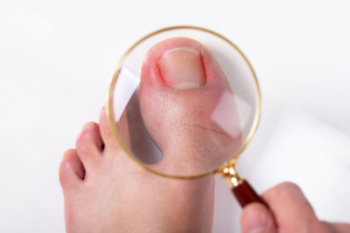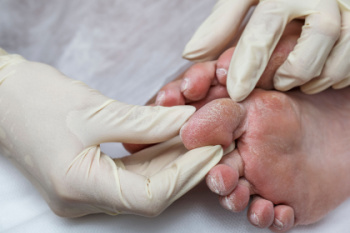
An ingrown toenail occurs when the edge of the toenail grows into the surrounding skin, causing irritation and discomfort. This condition most commonly affects the big toe and can result from improper nail trimming, wearing tight shoes, toe injuries, or inherited nail shapes. Symptoms include redness, swelling, pain along the nail edge, and sometimes infection with drainage or increased tenderness. If left untreated, an athlete's foot infection may worsen and lead to more serious complications. Diagnosis is usually made through a clinical examination of the affected toe. A podiatrist can provide relief by carefully removing the ingrown portion, treating any infection, and offering guidance on proper nail care. Ingrown toenails can cause severe pain and discomfort. If you have developed this condition, it is strongly suggested that you promptly contact a podiatrist who can offer appropriate treatment remedies.
Ingrown toenails can become painful if they are not treated properly. For more information about ingrown toenails, contact one of our podiatrists of Pennsylvania. Our doctors can provide the care you need to keep you pain-free and on your feet.
Ingrown Toenails
Ingrown toenails occur when a toenail grows sideways into the bed of the nail, causing pain, swelling, and possibly infection.
Causes
- Bacterial infections
- Improper nail cutting such as cutting it too short or not straight across
- Trauma to the toe, such as stubbing, which causes the nail to grow back irregularly
- Ill-fitting shoes that bunch the toes too close together
- Genetic predisposition
Prevention
Because ingrown toenails are not something found outside of shoe-wearing cultures, going barefoot as often as possible will decrease the likeliness of developing ingrown toenails. Wearing proper fitting shoes and using proper cutting techniques will also help decrease your risk of developing ingrown toenails.
Treatment
Ingrown toenails are a very treatable foot condition. In minor cases, soaking the affected area in salt or antibacterial soaps will not only help with the ingrown nail itself, but also help prevent any infections from occurring. In more severe cases, surgery is an option. In either case, speaking to your podiatrist about this condition will help you get a better understanding of specific treatment options that are right for you.
If you have any questions please feel free to contact one of our offices located in Plymouth Meeting and Ambler, PA . We offer the newest diagnostic and treatment technologies for all your foot and ankle needs.

A diabetic foot exam is a comprehensive evaluation of the feet performed to detect early signs of complications related to diabetes. This exam is essential because diabetes can lead to reduced circulation and nerve damage, increasing the risk of foot ulcers, infections, and loss of limb. Causes for needing this exam include prolonged elevated blood sugar levels, poor foot hygiene, and inappropriate footwear. Symptoms that may prompt an exam include numbness, tingling, swelling, changes in skin color, or non-healing wounds. Regular foot exams can help prevent serious complications and ensure early treatment. If you have diabetes, it is strongly suggested that you are under the care of a podiatrist who can perform routine foot evaluations and preserve mobility through proactive and personalized care.
Diabetic foot care is important in preventing foot ailments such as ulcers. If you are suffering from diabetes or have any other concerns about your feet, contact one of our podiatrists from Pennsylvania. Our doctors can provide the care you need to keep you pain-free and on your feet.
Diabetic Foot Care
Diabetes affects millions of people every year. The condition can damage blood vessels in many parts of the body, especially the feet. Because of this, taking care of your feet is essential if you have diabetes, and having a podiatrist help monitor your foot health is highly recommended.
The Importance of Caring for Your Feet
- Routinely inspect your feet for bruises or sores.
- Wear socks that fit your feet comfortably.
- Wear comfortable shoes that provide adequate support.
Patients with diabetes should have their doctor monitor their blood levels, as blood sugar levels play such a huge role in diabetic care. Monitoring these levels on a regular basis is highly advised.
It is always best to inform your healthcare professional of any concerns you may have regarding your feet, especially for diabetic patients. Early treatment and routine foot examinations are keys to maintaining proper health, especially because severe complications can arise if proper treatment is not applied.
If you have any questions please feel free to contact one of our offices located in Plymouth Meeting and Ambler, PA . We offer the newest diagnostic and treatment technologies for all your foot and ankle needs.

Heel pain may be a sign of bursitis, which occurs when one of the fluid-filled sacs in the back of the heel becomes inflamed. These sacs reduce friction between the heel bone, skin, and Achilles tendon. Bursitis can develop from repeated pressure, poorly fitting shoes, or underlying issues like arthritis or heel bone abnormalities. The pain is often located at the back of the heel and may be accompanied by swelling and tenderness. In some cases, redness and warmth are present. A podiatrist can determine whether bursitis is the cause of heel pain by performing an exam and using imaging studies, if needed. Medical treatment may include anti-inflammatory measures, fluid drainage, custom orthotics, or protective padding. When bursitis does not respond to initial care, surgery may be required to remove the inflamed bursa or correct structural problems in the heel. If you are experiencing heel pain, it is suggested that you schedule an appointment with a podiatrist for a diagnosis and appropriate treatment.
Many people suffer from bouts of heel pain. For more information, contact one of our podiatrists of Pennsylvania. Our doctors can provide the care you need to keep you pain-free and on your feet.
Causes of Heel Pain
Heel pain is often associated with plantar fasciitis. The plantar fascia is a band of tissues that extends along the bottom of the foot. A rip or tear in this ligament can cause inflammation of the tissue.
Achilles tendonitis is another cause of heel pain. Inflammation of the Achilles tendon will cause pain from fractures and muscle tearing. Lack of flexibility is also another symptom.
Heel spurs are another cause of pain. When the tissues of the plantar fascia undergo a great deal of stress, it can lead to ligament separation from the heel bone, causing heel spurs.
Why Might Heel Pain Occur?
- Wearing ill-fitting shoes
- Wearing non-supportive shoes
- Weight change
- Excessive running
Treatments
Heel pain should be treated as soon as possible for immediate results. Keeping your feet in a stress-free environment will help. If you suffer from Achilles tendonitis or plantar fasciitis, applying ice will reduce the swelling. Stretching before an exercise like running will help the muscles. Using all these tips will help make heel pain a condition of the past.
If you have any questions please contact one of our offices located in Plymouth Meeting and Ambler, PA . We offer the newest diagnostic and treatment technologies for all your foot and ankle needs.

